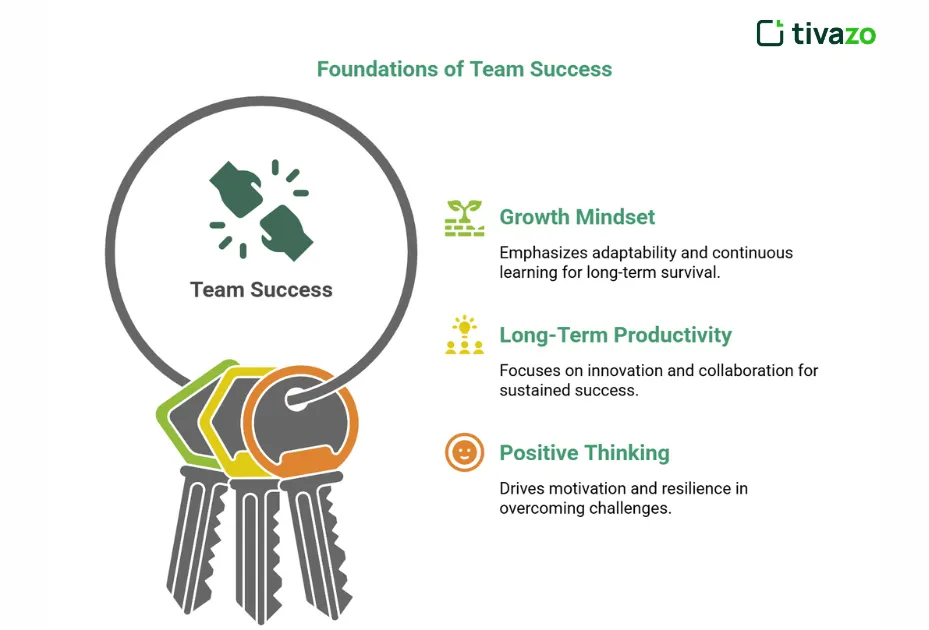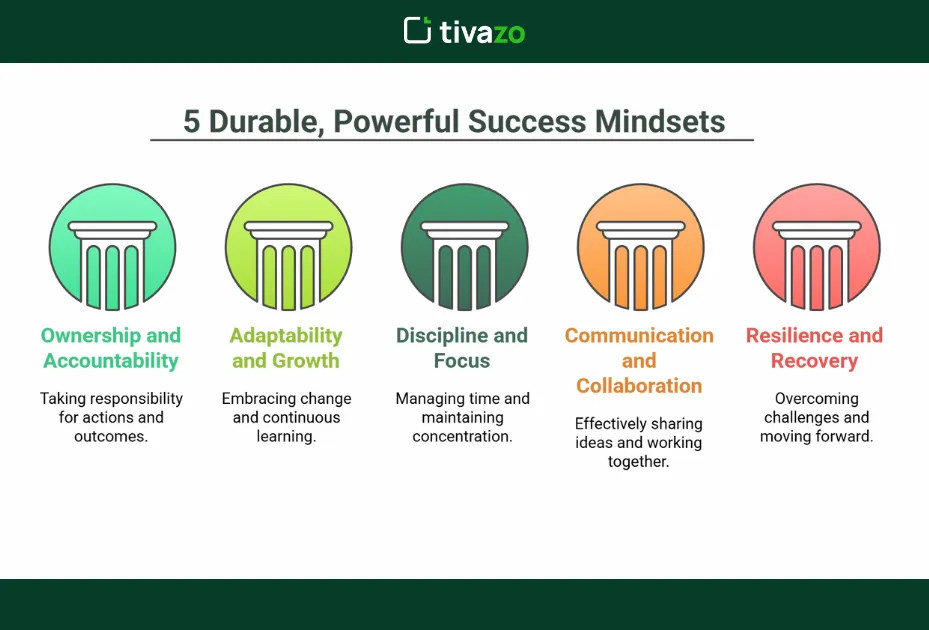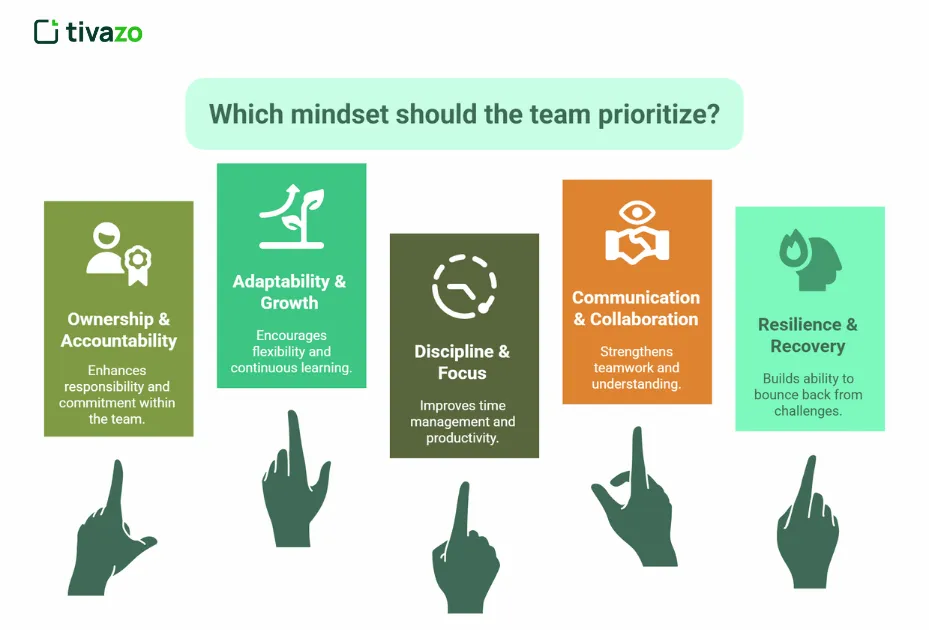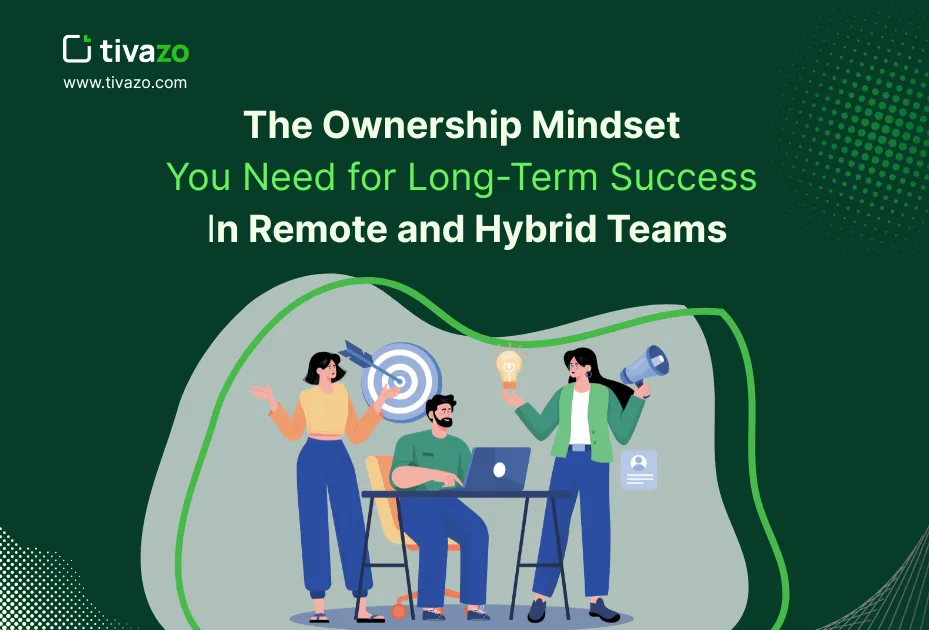Enduring Success in virtual and distributed teams does not happen randomly—it’s an outcome of the right attitude. What sets high-performing teams apart from others? It’s the ability to foster the kind of attitude that enables individual and team development. Teams with a focus on developing the right attitudes, specifically the ownership mindset, are more likely to achieve lasting success regardless of what work environment they are within.
In the case of remote and hybrid teams, long-term success is to a great extent a function of individual initiative and responsibility. When team members adopt the spirit of ownership, not only do they accept responsibility for their work, but they also accept ownership of the entire team’s goals. This leads to higher levels of engagement, responsibility, and therefore, productivity. It also forms the foundation of long-term success.
In this article, we will discuss five mindsets that result in long-term success in hybrid and remote teams. While the ownership mindset will be the focus, we will briefly discuss the other mindsets that result in growth, efficiency, and collaboration. These tips will help you build the proper culture and mindset to guarantee long-term success
Why Mindset Matters for Long-Term Success
Defining Long-Term Success for Remote and Hybrid Teams
For remote and virtual teams, success over the long haul is more than about success on short-term goals or the completion of projects. It’s more about developing a sustainable base that fosters constant growth, best productivity possible, employee contentment, and an environment for constant innovation. It’s more about creating a context where teams are able to succeed despite issues related to distance communication, work-life balance, and team collaboration.
Real success entails such teams being able to sustain their productivity today while at the same time setting up for tomorrow. This means that they should adapt strategies as the work environment changes and put the team in a position to lead in an ever-changing world.
So, what is long-term success really like? It is a synergy of engaged employees, constant improvement, and alignment that eventually means better business performance. When a company is great in all three dimensions, each and every member’s efforts count toward the team’s purpose, making for a stable basis for long-term growth and achievement.
The Power of Mindset for Long-Term Success

- Mindset is the driver of team success. Mindset contributes to long-term success the most. It is what dictates how far and how varied teams would coordinate work, how teams handle failure, and how they remain committed to higher goals.
- Growth mindset: A growth mindset emphasizes grit, adaptability, and learning. Growth mindset teams can weather storms and innovate their way to long-term survival.
- Long-term productivity: Growth mindset teams think constantly about how to do it differently and thrive long-term by working together and sheer creativity.
- Positive thinking produces results: Positive, growth mindset teams are more likely to work around challenges, stay motivated, and thrive long-term.
Ownership Mindset: The Key to Long-Term Success
- Facilitates accountability: An ownership mindset encourages team members to take complete ownership of the work that they perform and the long-term success of the team, holding themselves accountable.
- Initiative and autonomy: Ownership-oriented employees are effective time managers, work independently, and resolve problems by themselves, which is a need in hybrid and virtual teams.
- Enhances collaboration: An ownership attitude results in more constructive inputs on the part of team members, thus leading to better collaboration and generating a self-managing team culture.
- Enhances engagement: An ownership attitude empowers the employees, and this comes through as increased engagement, higher productivity, and long-term success.
5 Durable, Powerful Success Mindsets

Durable success isn’t just setting goals and accomplishing goals—it’s being in the right mind. For remote and hybrid work teams, the right mindset can alter the way they approach challenges and work together. The following are five powerful mindsets that will drive durable success.
Mindset 1: Ownership and Accountability
The ownership mentality is all about taking full ownership of your work, outcomes, and the team’s overall success. Members who embrace this mentality don’t wait for someone to tell them what to do—instead, they take action, problem-solve for themselves, and drive towards team objectives on their own initiative
Why It Works
Ownership creates personal responsibility, improves team performance, and speeds up problem-solving. With every member of the team being held responsible for their work, it equates to a more responsive and efficient workplace. Responsible team members who are accountable for their results perform better and are more willing to assist the team in achieving long-term success.
Actionable Tips:
- Utilize time-tracking tools like Tivazo in order to create accountability by monitoring individual and team productivity.
- Set clear goals and expectations so that each member of the team knows what needs to be done.
- Encourage self-reflection when the team members get a chance to review their work and find the areas where they need to improve.
Mindset 2: Adaptability and Growth
Flexibility is crucial in the agile work environments of today. Remote and hybrid teams require flexibility in new workflows, processes, and technologies. Constantly changing and growing teams are better equipped to manage change and stay competitive.
Why It Works
Flexibility can allow teams to thrive in periods of uncertainty, such as strategy change and new software implementation. Provided that teams embrace change rather than resisting it, they open the ground for innovation, growth, and sustainable prosperity.
Actionable Tips:
- Create a culture of ongoing learning, with arenas for ability improvement and knowledge sharing.
- Implement agile processes that are adaptable and modifiable as one wishes, so that they can be interchanged by the team members on a whim whenever necessary.
- Invest in continuous training so that the teams remain abreast of the latest processes and equipment.
Mindset 3: Discipline and Focus (Time Management)
Time management is likely to be the most crucial ability that virtual teams need. Since there is no office setup, the teams have to be self-motivated to stay focused and finish the job within the project schedule. Effective time management keeps employees engaged while working.
Why It Works
Effective time management means greater productivity, on-time delivery, and prevention of team burnout. Effective teams will be able to produce quality output without any additional stress.
Tips:
- Implement time-blocking strategies where team members allocate dedicated time blocks for work and meetings.
- Use time-tracking tools like Tivazo to track and document work hours, keep teams on schedule, and remove productivity bottlenecks.
- Encourage the application of productivity hacks like the Pomodoro technique to improve concentration and productivity.
Mindset 4: Communication and Collaboration
Great communication is most important for hybrid and distant teams. Since they are not communicating in person, teams should exert some effort to communicate and be on the same page, and this requires intentional communication and collaboration.
Why It Works
Communication-fueled teams are free of miscommunication, possess efficient processes, and have a good culture where every voice is heard. Good communication also increases collaboration, leading to more creative problem-solving and creativity.
Actionable Tips:
- Implement a routine cadence of check-ins to maintain communication oil-piped.
- Utilize collaboration tools like Slack, Microsoft Teams, or Zoom for ongoing discussion and keeping everyone in the know about the big picture.
- Develop feedback loops where members can give constructive feedback and appreciate others’ work.
Mindset 5: Bouncing Back and Moving Beyond Difficulty
Resilience is to recover from adversity, whether it is a missed deadline, project failure, or personal failure. Resilient teams will also be better able to cope with the inherent stress of working remotely, i.e., isolation, communication failure, or shifting priorities.
Why It Works:
Good teams can take a punch and still pursue sustainable prosperity during times of trouble. Resilience stands firm and robust in tough situations. Resilience is a determination and grit culture.
Actionable Tips:
- Encourage mental health habits such as stress management, mindfulness, and regular break-taking.
- Develop the attitude of seeing adversity as a chance to learn, not to fail.
- Encourage and support team members through difficult times so that they are motivated and empowered to cope with adversity.
How to Cultivate These Mindsets in Your Team

For hybrid and remote teams that want long-term success, having the right mindset is not just a leadership wish—it’s every team member’s job. Here’s how to cultivate healthy team mindsets like ownership, flexibility, discipline, communication, and resilience.
🔹1. Leadership Sets The Tone
Leaders set the team’s mindset. What leaders model, the team emulates.
For the correct mindset to take place, leaders must:
- Lead by example: Demonstrate accountability, time discipline, and growth-behavior on a daily basis.
- Clearly define expectations: Make it clear what success will be for individuals and the team.
- Provide development tools: Provide tools like Tivazo for time tracking, goal setting, and performance feedback.
- Encourage open discussion: Have an open forum for questions, feedback, and support.
When leaders lead by example with commitment and adaptability with commitment and predictability, the rest of the team finds it more comfortable to follow, especially in hybrid and remote teams.
🔹2. Inject Actionable Tools and Practices
Mindsets turn into habits with systems. Actionable tools like Tivazo enable us to maintain productivity, accountability, and focus.
Most effective practices for fostering mindset development:
- Leverage Tivazo for time spent, task completion, and team success tracking—all in real-time.
- Set quantifiable objectives for every team member and review them weekly.
- Implement discipline using tools like time blocking and weekly planning.
- Utilize week-by-week mini-goal targets and data review to guarantee continuous progress improvement.
With visible progress and open tracking, teams are more self-managed and results-oriented, essential to long-term success.
🔹 3. Create a Peer Support and Accountability Culture
Team culture reinforces the mindset. When peers encourage each other, mindsets develop faster.
To facilitate collaboration and growth across the team:
- Encourage peer-to-peer feedback to build trust and learn from one another.
- Celebrate small wins to build resilience and agility.
- Regular virtual check-ins and ideation of ideas.
- Reward teams with team dashboards using tools like Tivazo to encourage transparency.
In remote and hybrid teams, collaboration does not occur by accident. It requires intention, ongoing communication, and systems that get everyone moving in the direction of shared long-term goals.
With great leadership, the correct technology, and a collaborative culture, remote and hybrid teams can favorably build strong mindsets to create long-term success. Whether it’s time management, resilience in the face of challenges, or effective communication, honing these practices makes an effective, aligned, and future-proofed team.
Conclusion: Set the Platform for Long-Term Success
Mindset is more important than ever for long-term success in virtual and hybrid teams. The five powerful mindsets—Ownership and Accountability, Adaptability and Growth, Discipline and Focus, Communication and Collaboration, and Resilience—are not buzzwords. They are the platform on which to build high-performing, future-proofed teams.
All five mindsets are critical:
- Ownership frees responsibility and initiative.
- Adaptability allows teams to grow with changing requirements.
- Discipline locks in productivity.
- Communication sustains alignment and trust.
- Resilience enables teams to come back stronger from adversity.
By cultivating these attitudes, leaders can change how teams function—wherever teams function.
👉 Ready to apply these attitudes to your team?
Start by taking advantage of a genius tool like Tivazo. It helps you track time spent, track productivity, and connect goals to daily performance—easy to establish accountability and long-term movement.
The right system and the right attitude equal unstoppable success. Don’t wait—begin creating a more focused, empowered, and high-achieving remote team today.
🧠 Quick Quiz: Which Mindset Does Your Team Need Most?

Take 30 seconds to consider and comment below with the mindset your team needs to build right now:
Which of the following do you believe your remote/hybrid team needs to build most?
- Ownership & Accountability
- Adaptability & Growth
- Discipline & Focus (Time Management)
- Communication & Collaboration
- Resilience & Recovery
💬Share your selection below! Let’s get the conversation started on what fuels long-term success in contemporary workplaces.💬
🔍 FAQs
What is the meaning of long-term success?
Long-term success is always and sustained accomplishment in the long term. To distributed and hybrid teams, that means high levels of productivity, positive team culture, and ongoing flexibility in terms of adjusting to change—short-term success but foundation for growth in the long term.
Is long-term success hyphenated?
Yes, long-term is hyphenated when it is used to modify a noun—like in "long-term success" or "long-term goals." When used after a verb, however, it is usually not hyphenated. For example: "This will result in success in the long term.".
Why is long-term success important?
Long-term success is important because it brings stability, growth, and resilience in a shifting work landscape. For remote and hybrid teams specifically, it avoids burnout, encourages responsibility, and establishes a culture that can thrive—even as technology and workflows evolve.
What is long-term achievement?
Long-term success is the result of consistent effort and long-term planning. It is a matter of accomplishing key milestones that lead to meaningful business, personal, or team success. In virtual teams, this is generally described as high-level productivity, improved collaboration, and innovation.




